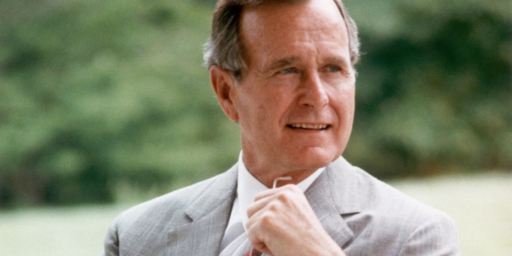Should Bush Have ‘Stayed the Course’ Past the Elections?
Dan Drezner believes that the administration’s abandonment of the “stay the course” mantra, while good from a public policy standpoint, may be quite harmful politically:
For the past five years, Democrats have been vulnerable on national security issues. Bush and the Republicans projected a clear image of taking the war to the enemy, and never yielding in their drive to defeat radical Islamists. The Democrats, in contrast, projected either an antiwar position or a “yes, but” position. The former looked out of step with the American people, the latter looked like Republican lite. No matter how you sliced it, the Republicans held the upper hand.
The recent rhetorical shift on Iraq, however, has flipped this phenomenon on its head. If Bush acknowledges that “stay the course” is no longer a satisfying status quo, he’s acknowledging that the Republican position for the past few years has not worked out too well. If that’s the case, then Republicans are forced to offer alternatives with benchmarks or timetables or whatever. The administration has had these plans before, but politically, it looks like the GOP is gravitating towards the Democratic position rather than vice versa.
If this is what the political optics look like, then the Republicans will find themselves in the awkward position of being labeled as “Democrat lite” in their positions on Iraq. And in elections, lite never tastes as good as the real thing.
I’ve argued previously that “stay the course” was a poor slogan, because it fueled the opposition talking point that the Bush team was too stubborn to adjust its Iraq strategy based on ever-shifting realities on the ground. Still, Dan may be right on the “optics.” It does seem that dropping the slogan has been perceived as some sort of admission that the whole policy has been a disaster and that there’s going to be a major shift after the election.
UPDATE: Commenter Cernig points to an interesting op-ed by Berkeley linguistics prof George Lakoff.
In the context of a metaphorical war against evil, “stay the course” evoked all these emotion-laden metaphors. The phrase enabled the president to act the way he’d been acting — and to demonstrate that it was his strong character that enabled him to stay on the moral path.
To not stay the course evokes the same metaphors, but says you are not steadfast, not morally strong. In addition, it means not getting to your destination — that is, not achieving your original purpose. In other words, you are lacking in character and strength; you are unable to “complete the mission” and “achieve the goal.”
“Stay the course” was for years a trap for those who disagreed with the president’s policies in Iraq. To disagree was weak and immoral. It meant abandoning the fight against evil. But now the president himself is caught in that trap. To keep staying the course, given obvious reality, is to get deeper into disaster in Iraq, while not staying the course is to abandon one’s moral authority as a conservative. Either way, the president loses.
There’s something to this. Emotion beats logic every time, frankly, for good or ill. Bush and Rove has used that to good effect in the past and it may now work against them.






Look, Bush is just bowing to the realities on the ground. GOP candidates with tough races have already abandoned the “Stay the Course” rhetoric as it was becoming increasingly untenable as a policy position. If he continued on that rhetoric he risked alienating even more supporters.
It may seem that way, but anyone who percieves that hasn’t been paying attention to Bush for the last several years. This is just more lip service to make on-the-fence people believe, just one more time, that he won’t lie to them again. He’s already said he’s going to ignore Baker’s recommendations. He had a planning conference with all the JCS and CENTCOM bigwigs about changing strategies, and then announced exactly no such thing at his presser. Bush has stated firmly, many times, that he is going to use the hammer of the military to fix Iraq, and no other tool will do. This is more lip service & voter distraction, and nothing but.
“Mars, bitches!”
Legion has it right. There is no policy change–it is entirely rhetorical.
Bush’s main problem is that he can’t own up to the fact that the war was an idiotic and tragic decision and that his administration was incapable of competently executing the war.
Furthermore, he has so consistently trumpeted the very people and elements of that failure. For crissakes, he gave the Medal of Freedom to Jerry Bremer and George Tenet–two of the most incompetent men involved in the war effort.
It is weird that he hasn’t canned Rummy, given the fact that he is acting like a trapped and wounded tiger, telling critics–as recently as yesterday–to “back off” and “relax.”
Perhaps ditching Rummy might be something that happens before the election as an “October surprise.”
This struck me as an oddly-timed bit of a desparation move on the part of an administration that is otherwise trying to project an air of calm assurance that the Republicans will still hold both houses of Congress after the November elections. And the manner in which Bush tried to show whatever it was he was trying to show, was clumsy at best. He could have said “look George, people have taken our repeated assertions that we were going to stay the course as a stubborn refusal to react to changing situations, and that isn’t what it’s been about. Here’s some examples…“. But what he did was to appear to claim that he’d never used the phrase. That just plays into the hands of those who say he isn’t on top of things.
James, it’s worth a look at cognitive scientist George Lakoff’s take on this, today in an NY Times op-ed.
(Lakoff’s also done some work for the Dems. I have an academic background in cognitive philosophy and I’m a lefty. I’m an avid follower of his work. There, that’s “full disclosure”. 🙂
Regards, C
Lakoff has talked about how good the Republicans have been at framing issues with words. Things like the “death tax” to replace the more benign estate tax. They’ve always been good at it.
This time they tried to frame the debate as “stay the course” versus “cut-n-run”. They thought that would work. We’ll see in a few days, but it looks like an all-time clunker. People may not be in favor of cut-n-run but they sure don’t seem to like stay the course, either.